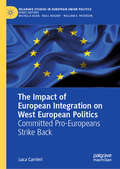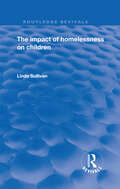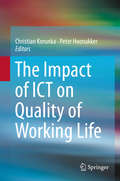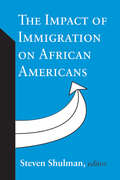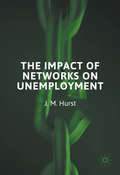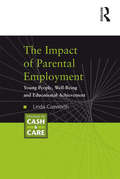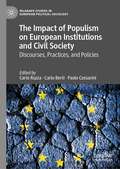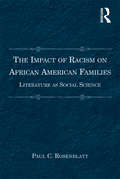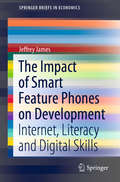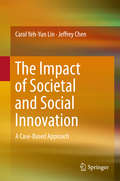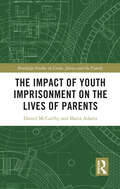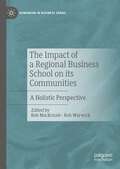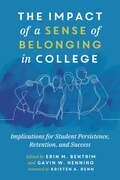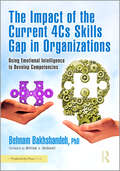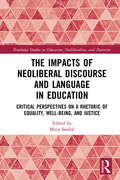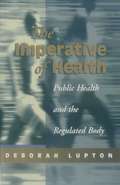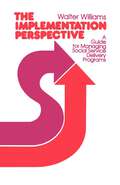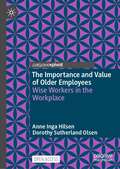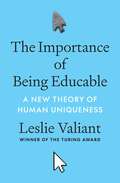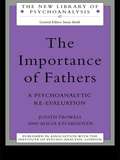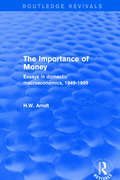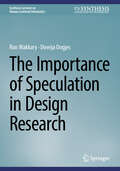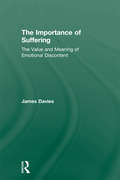- Table View
- List View
The Impact of European Integration on West European Politics: Committed Pro-Europeans Strike Back (Palgrave Studies in European Union Politics)
by Luca CarrieriThis book analyses emerging trends in the politicisation of EU conflicts in Western Europe between 2006 and 2019, evaluating the transformative effects arising from multiple crises – the Euro crisis, the migration crisis and the Brexit Referendum. It describes how EU issues have been increasingly emphasised and polarised by various political parties – both the mainstream pro-EU and anti-EU protest parties – and have been transformed into more meaningful determinants of voting. The respective chapters investigate the fluctuations in EU issue entrepreneurship and EU issue voting, identifying which party types have been more likely to benefit from their EU issue proximity to voters, and assessing the growing politicisation of the EU conflict in both South European and North-Western countries. This book will be of particular interest to students and scholars of political parties, European politics, Euroscepticism and voting behaviour.
The Impact of Homelessness on Children
by Linda SullivanFirst published in 1997. Presents the views of nine children ages seven to eleven on homelessness and how it impacts their lives. All nine children resided in shelters, reported violent and disruptive events in their past, and did not consider themselves homeless citing the shelter as their home.
The Impact of ICT on Quality of Working Life
by Christian Korunka Peter HoonakkerThis book discusses the impact and effects of Information and Communication Technologies (ICT) on quality of working life of employees. It describes the changes and the acceleration of processes caused by the widespread use of ICT in a broad range of working areas and in different national contexts. It explores the important role ICT has come to play in nearly all work places in developed societies and the impact it is starting to have on work places in developing countries. The book brings together experts from the fields of ICT and quality of working life and from a variety of backgrounds and disciplines, including sociology, psychology, industrial engineering and macro ergonomics. It discusses the range of current positive and negatives effects as well as the possible increase of both kinds of effects in the future. The final chapter of the book integrates the diverse perspectives of the authors and gives recommendations on how to increase the possible positive outcomes and to diminish negative effects of ICT in an accelerated society.
The Impact of Immigration on African Americans
by Steven ShulmanImmigration has significant consequences for all Americans, but especially for African Americans.áThe sheer magnitude of immigration--it is the primary factor driving population growth--is so large that it directly or indirectly affects the economic, political, social, and environmental circumstances of most Americans.áBut the geographic concentration of immigrants in urban areas, and the economic concentration of immigrants in the low-wage sector of the labor market, have special consequences for African Americans since they are especially likely to live in urban areas and to be low-wage workers.These effects can be both negative and positive. Immigration has sharply increased the supply of labor into the low-wage sector of the labor market, which tends to reduce wages and employment opportunities for low-wage native workers. Employers may prefer hiring immigrants, who are perceived to be hard working and uncomplaining, to hiring African Americans. Immigrants can also increase the competition for scarce public services (especially education) on which African Americans depend. Yet immigration can also stimulate economic growth and urban revitalization, which can increase job opportunities and spread an ideology of multiculturalism. Immigration can dilute the political power of African Americans, but it can also strengthen the civil rights coalition. Immigration can benefit some groups while hurting others.This volume presents research and analysis that reflects and advances the debates about the economic and political consequences of immigration for African Americans. The contributors include Gerald Jaynes (Yale University), Vernon Briggs (Cornell University), Frank Bean and Jennifer Lee (University of California, Irvine), Robert Cherry (Brooklyn College), Manuel Pastor (University of California, Santa Cruz) and Enrique Marcelli (University of Massachusetts, Boston), Steven Camarota (Center for Immigration Studies), Frank Morris (University of Texas, D
The Impact of Networks on Unemployment
by J. M. HurstThis book investigates why networks, some with joined-up governance remits, appeared ineffective in handling neighbourhood unemployment even in periods when the national unemployment levels dropped. It deploys a multi-theoretical and methodological framework to investigate this empirical puzzle, and to test and analyse the causal factors influencing network outcomes. Chapters examine network concepts, network theories, outcome indicators, the historical infrastructure and management of unemployment policy, and governing network trends in post-war urban regeneration interventions. Comparative network case studies offer empirical evidence and a high degree of local variation. Mixed methods (qualitative and quantitative approaches), including social network analysis, uncover formal and informal networks, and eighty-six interviews in two English local authorities with persistent unemployment, give voice to network practitioner experiences. Findings explain why sub-optimal network outcomes prevail and operational difficulties persist on the ground. Students and academics, professionals and activists can use the results to challenge network governance theories and the policy status-quo.
The Impact of Parental Employment: Young People, Well-Being and Educational Achievement (Studies In Cash And Care Ser.)
by Linda CusworthIn this groundbreaking study, Linda Cusworth explores the impact of parental employment or unemployment on the educational and emotional well-being of their children. Using theoretical apparatus from Bourdieu and data from the youth survey of the British Household Panel Study, the research in this book analyzes the impact of parental employment on those born between 1978 and 1990. This study is unique in going beyond the educational achievement and later patterns of employment of the young people studied to look at the whole of children's lives, including their attitudes and aspirations, relationships and emotional well-being. The changed norms of maternal employment and the substantial increase in lone parenthood over the last few decades make this an especially important study both for academics in social and public policy and sociology, and for policy makers.
The Impact of Populism on European Institutions and Civil Society: Discourses, Practices, and Policies (Palgrave Studies in European Political Sociology)
by Carlo Ruzza Paolo Cossarini Carlo BertiWhat is the impact of populism on the EU? How did the EU institutions and civil society react to the recent rise of populist parties? To answer such relevant questions and understand populism in terms of ideas, political outcomes, and social dynamics, academia needs to engage with institutional actors, civil society organizations, and policy makers. By bringing together academics, members of European institutions and agencies, and leaders of civil society organizations, this edited volume bridges the gap between research and practice. It explores how populism impacted on European institutions and civil society and investigates their reactions and strategies to overcome the challenges posed by populists. This collection is organized into three main sections, i.e., general European governance; European Parliament and Commission; European organized civil society. Overall, the volume unveils how the populist threat was perceived within the EU institutions and NGOs and discusses the strategies they devised to react and how these were implemented in institutional and public communication.
The Impact of Racism on African American Families: Literature as Social Science
by Paul C. RosenblattIn spite of the existence of statistics and numerical data on various aspects of African American life, including housing, earnings, assets, unemployment, household violence, teen pregnancy and encounters with the criminal justice system, social science literature on how racism affects the everyday interactions of African American families is limited. How does racism come home to and affect African American families? If a father in an African American family is denied employment on the basis of his race or a wife is demeaned at work by racist slurs, how is their family life affected? Given the lack of social science literature responding to these questions, this volume turns to an alternative source in order to address them: literature. Engaging with novels written by African American authors, it explores their rich depictions of African American family life, showing how these can contribute to our sociological knowledge and making the case for the novel as an object and source of social research. As such, it will appeal to scholars and students of the sociology of the family, race and ethnicity, cultural studies and literature.
The Impact of Smart Feature Phones on Development: Internet, Literacy and Digital Skills (SpringerBriefs in Economics)
by Jeffrey JamesThis novel book, motivated by the recent introduction of a major innovation in information technology, explores the possibility of the Internet being made available to millions of poor people in developing countries, who are not yet connected. The new technology, known as a smart feature phone, is based on open-source software and otherwise designed for a low-income population. The purpose of this book is to examine the origins, spread and impact of this innovation. Much attention is paid to literacy and digital skills, which determine the benefits that are actually derived.
The Impact of Societal and Social Innovation
by Carol Yeh-Yun Lin Jeffrey ChenThis book elaborates on the distinction between societal innovation and social innovation. It provides eight case studies to illustrate the scope, process, outcome, and impact of societal innovation and social innovation. In addition, the book proposes a model for interested parties to maximize their contribution for the common social good in a systematic and effective way. Case studies are used to illustrate concepts for readers to grasp the real essence of the relatively abstract notions of societal innovation and social innovation. In doing so, the book shows how small efforts can bring big benefits for the under privileged and to society as a whole. This book serves as a helpful resource for government officials, social innovation practitioners, social entrepreneurs, Non Profit Organizations, as well as students who would like to contribute to the common social good.
The Impact of Youth Imprisonment on the Lives of Parents (Routledge Studies in Crime, Justice and the Family)
by Daniel McCarthy Maria AdamsIt has long been argued that families play a crucial role in helping support prisoners during and beyond their time in prison. Through harnessing material and emotional support offered through family, prisoners can have a stronger commitment to move towards prosocial pathways via these important social ties. Yet, often overlooked are the experiences of families themselves in providing support for prisoners. This book focuses on parents whose adolescent male children are sent to prison. Charting many of the adversities which parents face – from violence, psychological stress, to stigma and shame – the book provides one of the first empirical assessments of the ways parents manage the consequences of serious crime and navigate relationships with their children in prison. As well as documenting major social hardships of imprisonment, the book will also assess the heterogeneous impacts on relationships between parents and their male children, including cases where relationships may improve or worsen over the sentence. With sensitivity to issues of gender, ethnicity and inequality in families, this book sheds new light on many of the problems of youth crime and presents a highly topical insight into the effects of imprisonment on parents. An accessible and compelling read, this book will appeal to students and scholars of criminology, youth justice, sociology and all those interested in the role of families in supporting prisoners.
The Impact of a Regional Business School on its Communities: A Holistic Perspective (Humanism in Business Series)
by Bob MacKenzie Rob WarwickThe place and impact of large, elite business schools is hotly debated. Compared to such establishments, little has been written about smaller, regional, community-oriented business schools that serve and interact with their various communities at home or abroad.Focusing on one of the smaller regional business schools in the UK, and incorporating perspectives from further afield, this book seeks to redress that balance. This local focus enables a more holistic understanding of what really goes on in terms of the complex relationships, practices, challenges and contexts at play in such an arena. The book, conceived throughout the Covid-19 pandemic, reverberates with a multiplicity of voices, perspectives and narratives, and reflects a process of collaborative autoethnography and critical friendship. It will be of great value to academics, students and others who are interested in optimising the benefits of regional business schools around the world.
The Impact of a Sense of Belonging In College: Implications for Student Persistence, Retention, and Success
by Gavin W. Henning Erin M. Bentrim"Over the last 10 years, colleges and universities have started grappling with the notion that their approaches to maintaining and increasing student retention, persistence, and graduation rates were no longer working. As focus shifted to uncovering barriers to student success while concurrently recognizing student success as more than solely academic factors, the term "student sense of belonging" gained traction in both academic and co-curricular settings. The editors brought this book into being to serve as a single point of reference in an emerging and promising field of study"-- Provided by publisher.
The Impact of the Current 4Cs Skills Gap in Organizations: Using Emotional Intelligence to Develop Competencies
by Behnam BakhshandehThe shortage of skills in the workforce is one of the major problems facing enterprises today. How American businesses and organizations intend to deal with these issues and operate in a global market under strong competition is one of their primary worries. The only logical and tangible solution to this issue is for the educational system and major businesses and organizations to begin making investments in educating more children and young adults in soft skills like the 21st-century 4Cs skills (critical thinking, communication, creativity, and collaboration) to prepare them to meet the challenges of emerging businesses and technologies. The 21st century has witnessed a rapid transformation in the global workforce and the skills required to thrive in it. Traditional knowledge-based skills alone are no longer sufficient to succeed in today’s complex and dynamic business environment. Instead, organizations increasingly value what is known as the "4Cs" skills: communication, collaboration, critical thinking, and creativity. However, a significant skills gap exists, where many employees lack these crucial abilities. This book explores the impact of the 21st-century 4Cs skills gap in organizations and how it affects their performance, innovation, and competitiveness. The 21st-century 4Cs skills gap poses a significant challenge for organizations across industries. The inability to communicate effectively, collaborate seamlessly, think critically, and foster creativity can hinder productivity, innovation, and competitiveness. As the business landscape continues to evolve, addressing this skills gap is not only a necessity but also a strategic imperative for organizations looking to thrive in the 21st century. Bridging the gap through training, recruitment, and a commitment to a learning culture will be essential for success in the increasingly complex and interconnected world of business.
The Impact of the First World War on British Universities: Emerging from the Shadows
by John TaylorThe First World War had innumerable consequences for all aspects of society; universities and education being no exception. This book details the myriad impacts of the war on British universities: telling how universities survived the war, their contribution to the war effort and the changes that the war itself brought about. In doing so, the author highlights the changing relationship between universities and government: arguing that a transformation took place during these years, that saw universities moving from a relatively closed world pre-1914 to a more active and open role within the national economy and society. The author makes extensive use of original documentary material to paint a vivid picture of the experiences of British universities during the war years, combining academic analysis with contemporary accounts and descriptions. This uniquely researched book will appeal to students and scholars of the history of higher education, social history and the First World War.
The Impacts of Neoliberal Discourse and Language in Education: Critical Perspectives on a Rhetoric of Equality, Well-Being, and Justice (Routledge Studies in Education, Neoliberalism, and Marxism)
by Mitja SardočThis edited collection combines quantitative content and critical discourse analysis to reveal a shift in the rhetoric used as part of the neoliberal agenda in education. It does so by analysing, uncovering, and commenting on language as a central tool of education. Focussing on vocabulary, metaphors, and slogans used in strategy documents, advertising, policy, and public discourse, the text illustrates how concepts such as justice, opportunity, well-being, talent, and disadvantage have been hijacked by educational institutes, governments, and universities. Showing how neoliberalism has changed discourses about education and educational policy, these chapters trace issues such as anti-intellectualism, commercialization, meritocracy, and an erasure of racial difference back to a contradictory growth in egalitarian rhetoric. Given its global scope, this volume offers a timely intervention in the studies of neoliberalism and education by developing a holistic vision of how the language of neoliberalism has changed how we think about education. It will prove to be an essential resource for scholars and researchers working at the intersections of education, policymaking, and neoliberalism.
The Imperative of Health: Public Health and the Regulated Body
by Deborah LuptonIn this reappraisal of public health and health promotion in contemporary societies, Deborah Lupton explores public health and health promotion using contemporary sociocultural and political theory, particularly that building on Foucault's writings on subjectivity, embodiment and power relations. The author examines the implications of the new social theories for the study of health promotion and health communication to analyze the symbolic nature of public health practices, and explores their underlying meanings and assumptions.
The Implementation Perspective: A Guide for Managing Social Service Delivery Programs
by Walter WilliamsAfter the "big" decisions are made in legislatures and executive offices, what is done by those who implement and operate social service programs will determine their success or failure. Yet, over and over again, the managers of public organization disregard or handle poorly the critical problems involved in starting and developing new programs or in modifying existing ones.This book presents a new decision-making rationale-the implementation perspective-as the basic guide to social service program management. The cardinal principle is that the central focus of policy must be at the point of service delivery. Here is where management must redirect its attention. The demand is to concentrate on the hard, dirty, time-consuming work of building the local delivery capacity needed to provide better social services and to implement new program decisions over time.The Implementation Perspective is a message for our times. Even those who would continue the nation's effort to meet its social obligations are finding that simply calling for big new programs and more spending is no longer satisfying. Moreover, Proposition 13, the balanced budget movement, inflation, and compelling demands for new funds in such areas as energy, now squeeze social programs. New directions may have to come, not from new funds, but from rethinking and redirection and, more to the point, the better management of existing programs.
The Importance and Value of Older Employees: Wise Workers in the Workplace
by Anne Inga Hilsen Dorothy Sutherland OlsenThis open access book makes a contribution to our understanding of one of the social challenges facing many western nations i.e. the challenge of an ageing population. It specifically addresses the issue of competence among older employees. Others have studied ageing populations in terms of the economic burden or the pressure on healthcare services and generally view the rising numbers of seniors more as a challenge than an opportunity. In this book, authors discuss ways of gaining positive benefits from our ageing and more experienced work force.
The Importance of Being Educable: A New Theory of Human Uniqueness
by Leslie ValiantIn the age of AI, why our future depends on better understanding what makes us humanWe are at a crossroads in history. If we hope to share our planet successfully with one another and the AI systems we are creating, we must reflect on who we are, how we got here, and where we are heading. The Importance of Being Educable puts forward a provocative new exploration of the extraordinary facility of humans to absorb and apply knowledge. The remarkable &“educability&” of the human brain can be understood as an information processing ability. It sets our species apart, enables the civilization we have, and gives us the power and potential to set our planet on a steady course. Yet it comes hand in hand with an insidious weakness. While we can readily absorb entire systems of thought about worlds of experience beyond our own, we struggle to judge correctly what information we should trust.In this visionary book, Leslie Valiant argues that understanding the nature of our own educability is crucial to safeguarding our future. After breaking down how we process information to learn and apply knowledge, and drawing comparisons with other animals and AI systems, he explains why education should be humankind&’s central preoccupation.Will the unique capability that has been so foundational to our achievements and civilization continue to drive our progress, or will we fall victim to our vulnerabilities? If we want to play to our species&’ great strength and protect our collective future, we must better understand and prioritize the vital importance of being educable. This book provides a road map.
The Importance of Disappointment
by Ian CraibThis sane and insightful discussion explores the nature of identity in late modern societies to criticize the way in which psychotherapy has become an ideology of late modernity and to emphasize the importance of `negative' messages in psychoanalytic theory.
The Importance of Fathers: A Psychoanalytic Re-evaluation (The New Library of Psychoanalysis #Vol. 42)
by Judith Trowell Alicia EtchegoyenIt is widely acknowledged that children need structure, security, stability and attachment to develop and flourish, and that the father is an important part of this. Issues such as high divorce rates, new family structures, increased mobility, women's liberation and contraception are very common in society. This book sets out to explore what has happened to men and to fathers during all these changes and transitions. Judith Trowell and Alicia Etchegoyen, along with an array of renowned contributors, consider the importance of fathers in various situations, including: the role of the father at different stage of children's development the missing father loss of a father grandfathers. It is argued that the father is important, not only to support the main carer (usually the mother) but also to provide a caring, thinking, comfortable, confident presence.
The Importance of Money: Essays in Domestic Macroeconomics, 1949-1999 (Routledge Revivals)
by H.W. ArndtThis title was first published in 2001. A collection of essays written by H.W. Arndt, over a 50 year period, that cover a broad range of his work, from analytical issues in monetary and fiscal theory to political economy. The earlier essays should appeal to those interested in the history of economic thought whilst the more recent essays deal with issues such as economic globalization.
The Importance of Speculation in Design Research (Synthesis Lectures on Human-Centered Informatics)
by Ron Wakkary Doenja OogjesThis book explores speculation in design research in the field of human-computer interaction (HCI). The authors reveal how speculative reasoning in design research increases the capacity of HCI to address a wider array of social and research challenges. Speculation in design research employs (1) leaps of imagination, (2) diverse ways of knowing or epistemologies, (3) ethical reflexivity, (4) and makes alternate possibilities experiential. This book shows how each can be productively and critically applied together through existing, emerging, and new research approaches in HCI. The aim of this book is to generously see speculation as more than a form of critique or genre of design research, to instead be seen as broadly central to the material investigations that govern much of the field. In doing so, the book aims to expand the potential role of speculation in HCI and shows how speculation is applicable to a wide range of research goals, which, in turn, creates research approaches in new directions. In expanding the approach and methodology of speculation in HCI, the books draw inspiration from other disciplines and intersectional perspectives. By examining current, emerging, and possible new forms of speculation methods, this book will be of interest to undergraduate and graduate students in HCI as well as seasoned researchers and practitioners.
The Importance of Suffering: The Value and Meaning of Emotional Discontent
by James DaviesIn this book James Davies considers emotional suffering as part and parcel of what it means to live and develop as a human being, rather than as a mental health problem requiring only psychiatric, antidepressant or cognitive treatment. This book therefore offers a new perspective on emotional discontent and discusses how we can engage with it clinically, personally and socially to uncover its productive value. The Importance of Suffering explores a relational theory of understanding emotional suffering suggesting that suffering, does not spring from one dimension of our lives, but is often the outcome of how we relate to the world internally – in terms of our personal biology, habits and values, and externally – in terms of our society, culture and the world around us. Davies suggests that suffering is a healthy call-to-change and shouldn't be chemically anesthetised or avoided. The book challenges conventional thinking by arguing that if we understand and manage suffering more holistically, it can facilitate individual and social transformation in powerful and surprising ways. The Importance of Suffering offers new ways to think about, and therefore understand suffering. It will appeal to anyone who works with suffering in a professional context including professionals, trainees and academics in the fields of counselling, psychotherapy, psychoanalysis, psychiatry and clinical psychology.
